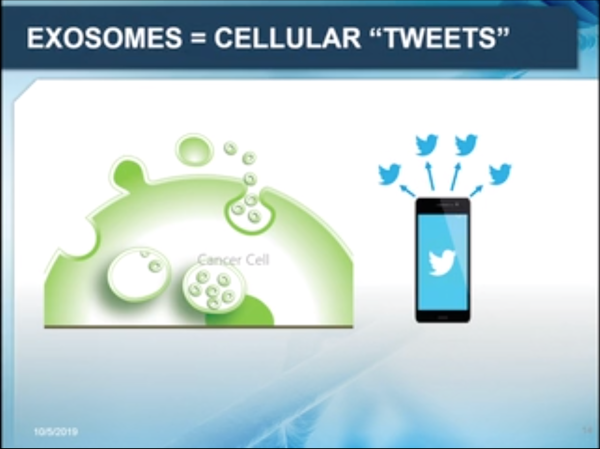Judd W. Moul, MD, presented “Exosomal Liquid Biopsy in Prostate Cancer: Role in Prostate Biopsy Decision-Making” during the 4th Global Summit on Precision Diagnosis and Treatment of Prostate Cancer on October 3, 2019 in Boston, Massachusetts.
How to cite: Moul, Judd W. “Exosomal Liquid Biopsy in Prostate Cancer: Role in Prostate Biopsy Decision-Making” October 3, 2019. Accessed Jan 2025. https://exosomal-liquid-biopsy-in-prostate-cancer-role-in-prostate-biopsy-decision-making/
Exosomal Liquid Biopsy in Prostate Cancer: Role in Prostate Biopsy Decision-Making – Summary:
Judd Moul, MD, Professor of Surgery and Anesthesiology as well as the James H. Semans, MD, Distinguished Professor of Urologic Surgery at Duke University School of Medicine, discusses the ExoDx Prostate Intelliscore (EPI), a urine-based liquid biopsy test with high negative predictive value (NPV) that may be a useful prostate cancer (PCa) diagnostic tool for primary care providers (PCPs). He emphasizes EPI’s relative ease of use, noting that it is necessary to have simple screening procedures in order to take the burden off of over-stretched urologists.
Abstract:
Over the past decade, the urology community’s reliance on PSA screening for PCa has sharply declined. PSA has been shown to have poor specificity, and its widespread use led to overdiagnosis and overtreatment. However, diagnostic screening is still needed, especially screening that can be performed by PCPs so that the burden on urology practices is minimized. Researchers have looked at ways to increase PSA specificity, including using risk calculators, MRI imaging, and biomarkers. One promising biomarker test is EPI, or the ExoDx Prostate Intelliscore.
EPI is a urine-based liquid biopsy test that targets exosomal RNA. Exosomes are released from cells as a means of communication. They are a “treasure trove” for biomarkers, including RNA. EPI targets a 3-gene RNA signature in order to risk-stratify the likelihood of high-grade PCa in men 50 years or older who have a PSA of 2-10 ng/mL. EPI has been the subject of a significant number of peer-reviewed publications and presentations, including two validation studies. With similar cohorts and both using a cut-point EPI score of 15.6, the validation studies found that by using EPI, 23.4% of patients avoided biopsy. They also found that EPI had a sensitivity of 92.5%, a specificity of 30.2%, and an NPV of 90.4%. EPI also performs well in both initial and prior negative biopsy populations.

At Duke University, urologists are working to facilitate the widespread use of EPI. Since PSA has been out of favor for a decade, the younger generation of PCPs does not understand PSA or know how to perform a digital rectal exam, so there is a knowledge barrier. Fortunately, EPI is a relatively easy test to perform, due in part to exosomal RNA’s high level of stability, and produces quick results, making it a good test for this setting.
About The 4th Global Summit on Precision Diagnosis and Treatment of Prostate Cancer:
The Global Summit on Precision Diagnosis and Treatment of Prostate Cancer is a multi-day, multi-disciplinary forum dedicated to informing healthcare stakeholders about topics including in-vitro fluid- and tissue-based molecular diagnostics, novel observation strategies such as active surveillance, and novel therapeutic interventions. Along with this forum’s efforts to form a consensus on the future of prostate diagnostics and precision care, it aims to create an educational and research strategy for its realization. Dr. Moul presented this lecture during the 4th iteration of this Summit in 2019.
ABOUT THE AUTHOR
Dr. Judd Moul joined the Duke faculty in mid-2004 after a career in the US Army Medical Corps, primarily at Walter Reed Army Medical Center. He is a retired colonel as well as a noted researcher and clinician in the area of prostate cancer. and is a urologic oncologist. He served as the Division Chief of Duke’s Division of Urology from 2004 to 2011 and was named the James H. Semans, MD, Professor of Surgery in 2009, becoming Duke’s first named endowed chair for urology. He was awarded the Gold Cystoscope Award from the American Urologic Association as well as Castle Connelly Physician of the Year for Clinical Medicine in 2009. He has performed more than 1300 radical prostatectomies since joining the Duke faculty and is committed to outcomes research on this series and in other areas of prostate cancer. He was the Editor for Prostate Cancer and Prostatic Disease, a Nature Medicine journal, for more than a decade, and is a popular speaker and lecturer, having served as a visiting professor and keynote speaker throughout the US and internationally. He is committed to training residents and mentoring students and trainees.

